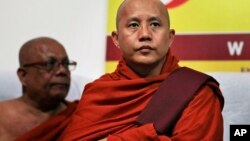A renowned Buddhist monk’s condemnation of fellow monk Ashin Wirathu, Myanmar’s most prominent Buddhist nationalist, has given hope to activists trying to promote tolerance in a divided society and rescue Buddhism from hard-line nationalists.
Buddhist nationalism, which presents Muslims as an existential threat to Buddhist-majority Myanmar, has shaken the country’s politics since democratic reforms were launched in 2011. In recent months, influential monks and their lay acolytes have stoked public support for the military in its brutal crackdown on Rohingya Muslims in Rakhine State.
At a news conference in Yangon on Feb. 25, Ashin Issariya — the monk known popularly as Min Thu Nya, or “King Zero” — called for monastic authorities to punish Wirathu for flouting a one-year ban on his inflammatory sermons, imposed in March last year, and asked that other monks publicly distance themselves from him.
The event had to be relocated from the office of the Myanmar Journalist Network to a monastery after Wirathu supporters arrived and sparked a confrontation. In Myanmar, contradicting monks is culturally taboo and critics of hard-line monks face lawsuits and intimidation.
Saffron Revolution
Min Thu Nya was a leading figure in the so-called Saffron Revolution in 2007, when monks led a mass uprising against the military junta. Originally from Kayin State in eastern Myanmar, the monk has re-established himself after years of exile in Thailand.
Yet his recent message, delivered on behalf of the Anti-Adhamma Committee, a group that opposes ultra-nationalists, did not center on secular principles of pluralism and democracy. Instead, he argued the threat Wirathu and his hard-line political message poses to the integrity of Buddhism and the country’s venerated monkhood, or sangha.
“Monks should be a model for people,” Min Thu Nya later told VOA. “But if they start treating people cruelly, which is the opposite of what Buddha preached, then people will lose respect for the sangha.”
He said he hopes to motivate “those who are speaking out for the truth. […] I want to encourage them to keep doing this bravely.” However, he insisted “the Rakhine issue is separate.”
Support for Wirathu
Though Wirathu and the main Buddhist nationalist group have grown more distant from each other over the last year, Wirathu still commands support within the movement.
Ashin Thaw Parka, a leading member of the hard-line Buddha Dhamma Parahita Foundation — formerly known as Ma Ba Tha — accused Min Thu Nya of overstepping the mark by criticizing a fellow monk in his Feb. 25 statement.
“He accused Ashin Wirathu of not following the way of Buddha. This is not his job,” he said. “How much does he know about the way of Buddha?”
The previous government of President Thein Sein treated nationalist monks’ groups such as Ma Ba Tha, the Association for the Protection of Race and Religion, lightly, with members of the ruling party and military establishment offering patronage.
Ma Ba Tha’s biggest political victory, the passing of four discriminatory laws to “protect race and religion” in 2015, has not been matched by any formal successes under the National League for Democracy (NLD) government, which took over in 2016.
Under government prodding, the State Sangha Maya Nayaka, or Ma Ha Na, the committee of senior monks tasked with regulating Buddhist monastic orders, has in the last two years issued ordinances withholding recognition from, and restricting the activity of, Ma Ba Tha. This has diminished their power to lobby parliament and mobilize on a grand scale.
Matthew Walton, an Oxford scholar who writes about Buddhism and political thought in Myanmar, told VOA Ma Ba Tha is now “contained as public-political voice, but not broken as a movement.”
Moreover, he said, radical elements are “moving underground, or to fringe groups.” The NLD lacks a “concerted plan” for this more diffuse threat, Walton said, partly because the party “has avoided dealing with the issue of Buddhist identity,” allowing nationalists to stake a monopoly in addressing concerns about preserving tradition amid rapid change.
Stronger stand
Myanmar interfaith activist Thet Swe Win, who was present at the news conference, applauded Min Thu Nya’s “brave move” but told VOA that given the government’s inadequate stance, civil society and more progressive monks need to form a stronger, more united front to counter the organizational clout of nationalist groups.
The difficulty, he said, is the resistance largely lives on social media. Posts condemning or ridiculing Wirathu on Facebook are commonplace. However, only around 30 people turned up to support Min Thu Nya on Feb. 25, and had to contend with close to 200 nationalist agitators, who swarmed the street outside the venue, he said.
“People are very brave online, because they don’t have to show their identity. But it’s very difficult for us to bring those online people onto the ground,” he said. “When we really need to show up, we never come.”
Additional reporting by Aung Naing Soe in Yangon




